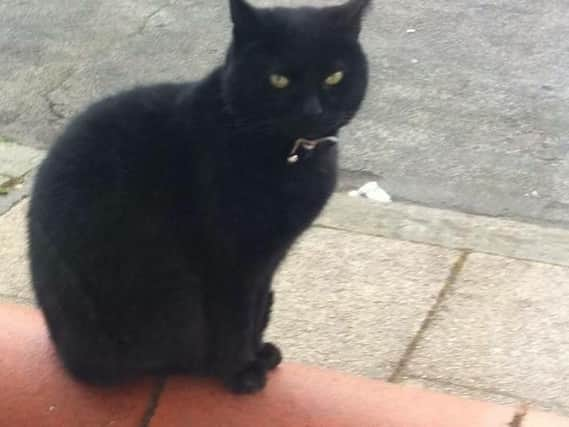Warning after Fleetwood pet owner claims 'cat was poisoned'


The owner, who wishes to remain anonymous, noticed a problem with her cat Logan's health on Sunday, October 1 after he started walking into furniture and walls and drinking large amounts of water.
His owner said: "Throughout the day we all noticed Logan was very ‘up and down’, seeming okay one minute and the next very dazed and spaced out.
Advertisement
Hide AdAdvertisement
Hide Ad"As the evening went on Logan became very unwell, walking into furniture and walls and too the point of being sick, and drinking excessive amounts of water, at this point we knew Logan was in need of veterinary attention.
"We tried too access an emergency vet but this was unsuccessful despite our worry for our family pet.
"We sat with Logan for a large proportion of the night where he just wondered around and slept on and off. At 4am we went up to bed, once Logan was settled and we believed that he seemed okay.
"Early the next morning, we woke and went downstairs to see Logan, there was sick on the floor from where he had clearly woken during the night and wondered round, his water bowl also empty. When we looked into Logan’s basket, he seemed asleep but when prompted to wake he was unresponsive.
Advertisement
Hide AdAdvertisement
Hide Ad"This is when we discovered that our beloved family pet of seven years, had sadly passed away in his sleep.
"With the symptoms Logan showed, there was no doubt in our mind he passed away due to being poisoned.
"We checked him and there were no visible injuries or any blood to suggest he was injured or hurt, by a car for example nor did he wince or show any pain when picked up and comforted.
"We hope that this story can raise some form of awareness to all pet owners, so they can hopefully avoid this heart-breaking ordeal that we have had to deal with. We also ask that people be vigilant and check their gardens before letting your animals out."
Advertisement
Hide AdAdvertisement
Hide AdLocal vet, Ian Wright, of Mount Vets in Fleetwood confirmed that he had received a separate suspected case of a cat that had been poisoned with antifreeze this week.
But he stressed that such poisonings were not uncommon at this time of year and that they were often accidental.
He said: "It's a real tragedy when people lose their pets especially when its unexpected.
"The symptoms that are described here however, could be due to a number of different conditions. For example thirst could suggest kidney failure or diabetes.
Advertisement
Hide AdAdvertisement
Hide Ad"There's a very long list of different conditions that can cause these signs and it's almost impossible to be certain on the cause without a clinical examination or further tests.
"If your pet is unwell and you suspect it has been poisoned it is important to seek urgent veterinary help.
"Antifreeze poisonings (or ethylene glycol poisonings) of cats are more common at this time of year as people are preparing their cars for winter.
"Cats can be exposed by licking containers filled with the liquid or leaking car radiators and they only need to consume a very small amount for it to cause very serious damage.
Advertisement
Hide AdAdvertisement
Hide Ad"Antifreeze poisonings are very rarely malicious and are more often down to improper storage.
"However, if you do suspect that your pet has been poisoned it is very important to report it to the authorities as they will be able see if there are any patterns or clusters."
Police confirmed they had received a report of animal poisoning in Fleetwood.
A spokesman said: "A woman attended Fleetwood police station reporting that somebody had killed her cat and that it had been killed by poisoning.
Advertisement
Hide AdAdvertisement
Hide Ad"When asked she was unable to provide any actual proof that her pet had been poisoned."
Cats that have been affected by antifreeze poisoning will often show signs such as excessive salivating, not eating their food, twitching and other neurological problems.
If your pet shows any of these symptoms seek urgent veterinary care.